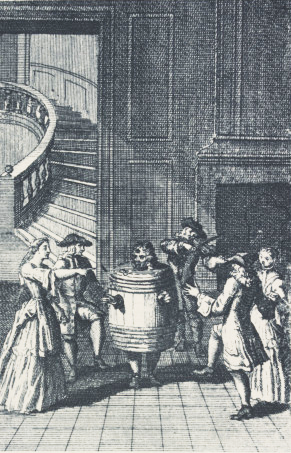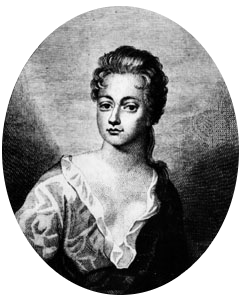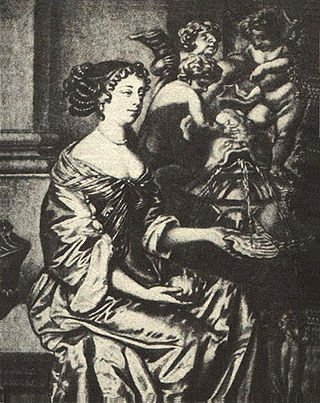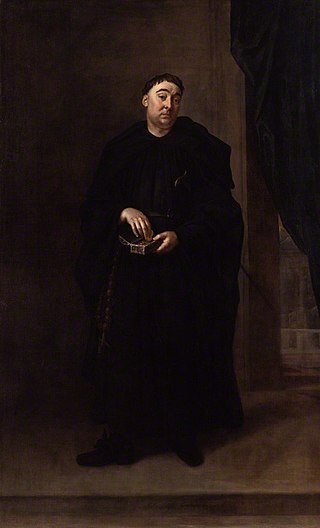Related Research Articles

"Restoration comedy" is English comedy written and performed in the Restoration period of 1660–1710. Comedy of manners is used as a synonym for this. After public stage performances were banned for 18 years by the Puritan regime, reopening of the theatres in 1660 marked a renaissance of English drama. Sexually explicit language was encouraged by King Charles II (1660–1685) personally and by the rakish style of his court. Historian George Norman Clark argues:
The best-known fact about the Restoration drama is that it is immoral. The dramatists did not criticize the accepted morality about gambling, drink, love, and pleasure generally, or try, like the dramatists of our own time, to work out their own view of character and conduct. What they did was, according to their respective inclinations, to mock at all restraints. Some were gross, others delicately improper.... The dramatists did not merely say anything they liked: they also intended to glory in it and to shock those who did not like it.

Elizabeth Barry was an English actress of the Restoration period.

Thomas Betterton, the leading male actor and theatre manager during Restoration England, son of an under-cook to King Charles I, was born in London.
Susanna Verbruggen, aka Susanna Mountfort, was an English actress working in London.
Barton Booth was one of the most famous dramatic actors of the first part of the 18th century.

Anne Bracegirdle was an English actress.
Elizabeth Boutell, was a British actress.

Martin Folkes was an English antiquary, numismatist, mathematician and astronomer who served as the president of the Royal Society from 1741 to 1752.
Mary Porter was an English actress.

Mary Saunderson (1637–1712), later known as Mary Saunderson Betterton after her marriage to Thomas Betterton, was an actress and singer in England during the 1660s and 1690s. She is considered one of the first English actresses.

Cave Underhill (1634–1710?) was an English actor in comedy roles.

Anthony Leigh was a celebrated English comic actor.

Sir Patient Fancy: A Comedy, is a comedic play written by Aphra Behn, first performed in 1678. It is Behn's first overtly political play. It was staged by the Duke's Company at the Dorset Garden Theatre in London with a cast that included Nell Gwyn as Lady Knowell, Anthony Leigh as Sir Patient Fancy, John Crosby as Leander Fancy, Thomas Betterton as Wittmore, William Smith as Lodwick Knowell, James Nokes as Sir Credulous Easy, John Richards as Curry, Elizabeth Currer as Lady Fancy, Mary Betterton as Isabella, Emily Price as Lucretia and Anne Shadwell as Maundy.
Elfrid: or The Fair Inconstant, generally shortened to Elfrid, is a 1710 tragedy by the British writer Aaron Hill.
Mary Willis was a British stage actress of the eighteenth century.
Elinor Leigh was a British stage actor of the seventeenth century.
The Woman Captain; Or, The Usurer Turned Soldier is a 1679 comedy by the English writer Thomas Shadwell. It was originally staged by the Duke's Company at Dorset Garden Theatre in London. The original cast is unknown except for Elizabeth Barry who played the title role, and also read the epilogue. It is part of the tradition of Restoration Comedy that flourished during the era.
Charlotte Butler was an English stage actress and singer of the seventeenth century. She may have joined the Duke's Company in the 1670s, but her first definite recorded performance was in Aphra Behn's The Revenge (1680) The anonymous A Satyr on The Players describes her,
References
- 1 2 3 4 5 Betterton, Thomas (1741). "Chap. V. Some account of Mrs Guyn, Mrs Porter, Mrs Bradshaw, &c". The history of the English stage, from the restauration to the present time. Including the lives, characters and amours, of the most eminent actors and actresses. With instructions for public speaking; wherein the action and utterance of the bar, stage, and pulpit are distinctly considered. London: E. Curll . Retrieved 16 January 2015.
- ↑ Wheatley, Henry Benjamin (1891). London Past and Present: Its History, Associations, and Traditions. Cambridge UP (original ed John Murray) (published 2011). p. 205. ISBN 9781108028073 . Retrieved 16 January 2015.
- 1 2 "Martin Folkes". Westminster Abbey. Retrieved 16 January 2015.
- ↑ "Martin Folkes (1690–1754)". Oxford Dictionary of National Biography (online ed.). Oxford University Press. doi:10.1093/ref:odnb/9795.(Subscription or UK public library membership required.)